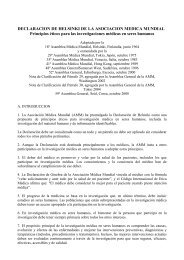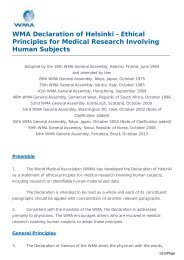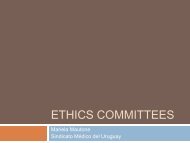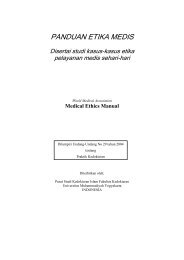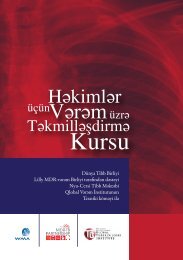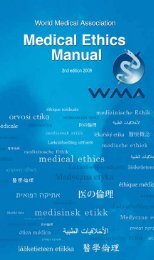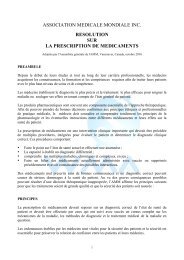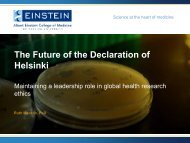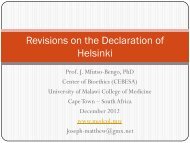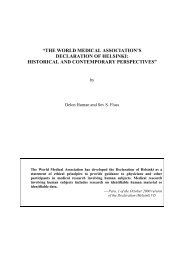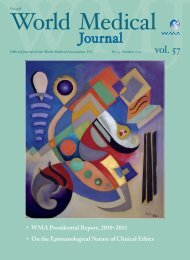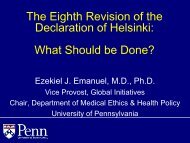WMJ 03 2010 - World Medical Association
WMJ 03 2010 - World Medical Association
WMJ 03 2010 - World Medical Association
- No tags were found...
Create successful ePaper yourself
Turn your PDF publications into a flip-book with our unique Google optimized e-Paper software.
WMA news<br />
tion were discussed and a special focus was<br />
placed on how to assure quality of care and<br />
education. Another discussion point was the<br />
financing of national health care systems.<br />
None of the international and multilateral<br />
donors report how much money from vertical<br />
programmes is allocated to human resources<br />
in health and to education. Money<br />
that is not reported money cannot be monitored<br />
and managed.<br />
The participants of the Seminar in Reykjavik<br />
on Human Resources for Health and<br />
the Future of Health Care last year defined<br />
ideas to facilitate WMA policy development<br />
in this area. The WMA Advocacy<br />
Working Group has considered the opportunity<br />
to collect best practices. Task shifting<br />
remains as a monitoring item of the Working<br />
Group.<br />
In March 2009, WMA was invited to take<br />
part in the planning process of the next<br />
Conference on Workplace Violence in<br />
the Health Sector, which is scheduled<br />
to take place from 27-29 October, <strong>2010</strong><br />
in Amsterdam. The event is supported by<br />
the Global Health Workforce Alliance<br />
(GHWA), WHO, International Labour<br />
Organisation (ILO), the International<br />
Council of Nurses (ICN), Public Services<br />
International (PSI) and other relevant<br />
health organizations.<br />
WHO is in the final stage of the development<br />
of guidelines on retention strategies<br />
for health professionals in rural areas. The<br />
objective is to attract and retain<br />
health care professionals in rural<br />
areas. The guidelines will be based<br />
on three pillars: educational and<br />
regulatory incentives, monetary<br />
incentives and management,<br />
environment and social support.<br />
Decision makers on the national<br />
and local levels and health facilities<br />
should receive evidence<br />
on the impact and effectiveness<br />
of various retention strategies<br />
that have been tried and tested.<br />
In November 2009 WHO, together<br />
with the Asian-Pacific<br />
Action Alliance on Human<br />
resources for Health (AAAH),<br />
held a conference to discuss with<br />
governments in Asia this topic<br />
in general and, in particular,<br />
how the guidelines need to be<br />
adapted to be better accepted by<br />
governments.<br />
WMA participates as a member<br />
of steering groups in two projects<br />
commissioned by the European<br />
Union on the Mobility and Migration<br />
of Health Professionals. One project<br />
is led by the European Health Care Management<br />
<strong>Association</strong> and the other by the<br />
Research Institute of the German Hartmann<br />
Bund, a private physicians organization.<br />
The general objective of the research<br />
projects is to assess the current trends in<br />
mobility and migration of health professionals<br />
to, from, and within the European<br />
Union, including their reasons<br />
for moving. Research will also<br />
be conducted in non-European<br />
sending and receiving countries,<br />
but the focus lies within<br />
the EU. This research project<br />
is a medium-scale collaborative<br />
project with a goal of facilitating<br />
informed policy decisions<br />
on health systems by developing<br />
a scientific evidence base related<br />
to the impact of mobility<br />
of health professionals.<br />
In January 2011 the Global Health Workforce<br />
Alliance will organise the 2nd Global<br />
Forum on Human Resources in Health<br />
(HRH) in Thailand. WMA is part of the<br />
thematic focus committee for this event. In<br />
an initial meeting, two main themes were<br />
proposed: improving quantity and quality<br />
of health workforce for equitable access to<br />
primary health care within a robust health<br />
system and financing HRH in the light of<br />
the global financial crisis.<br />
1.4 Counterfeit <strong>Medical</strong> Products<br />
Counterfeit medicines are manufactured<br />
which are below established standards of<br />
safety, quality and efficacy. They are deliberately<br />
and fraudulently mislabeled with<br />
respect to identity and/or source. Counterfeiting<br />
can apply to both brand name and<br />
generic products and counterfeit medicines<br />
may include products with the correct ingredients<br />
but fake packaging, with the<br />
89



